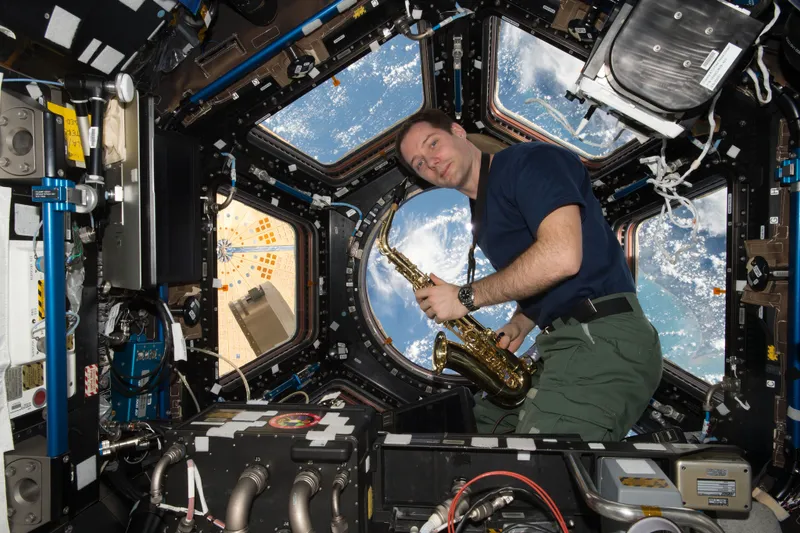As the needle touches down on a vinyl record, so has music itself touched down on other worlds beyond Earth.
Whether the melodies have been transmitted from Earth’s surface or launched aboard spacecraft into space, it can be said that music has twinkled the stars.
Radio signals have been leaving our planet for years, and even now, someone, somewhere, may be playing the PopMaster quiz on a distant world – and still getting it wrong.
It’s a comforting thought to consider that vastly superior alien life may not be able to name that Number One hit from the 1980s.

Music in the Apollo era
The crew of Apollo 10 managed to make their own ‘music’ in space.
As the astronauts rounded the far side of the Moon in 1969, they reported whistling sounds to NASA officials back on Earth.
These notes turned out to be the result of crossed wires in the communication system between the lunar module and the command module.
However, in a test-run for Apollo 11’s actual playing of the track on the lunar surface later, Frank Sinatra’s ‘Fly Me to the Moon’ made its first trek with Apollo 10.
Aside from Ol’ Blue Eyes, the Apollo 11 crew had other music on mixtapes to accompany them on their lunar trip.
Among Neil Armstrong’s collection of favourite tunes were tracks from Les Baxter’s 1947 album Music Out of the Moon, along with other 20th-century favourites such as Peggy Lee, Barbra Streisand and Glen Campbell.
This tradition continues today, but rather than transporting music, astronauts are woken up by it.
Music in the modern Space Age
The crew aboard the International Space Station receive ‘wake-up music’ from Mission Control, as did astronauts aboard the Space Shuttle.
Back in 1988, the crew of the Soviet Soyuz TM-7 mission took with them Pink Floyd’s just-released live album, Delicate Sound of Thunder, which band member David Gilmour claimed was the first rock music recording to make it into space.
However, that claim was duly challenged, with the prize having already gone to some of the cassette tapes carried on board Apollo 15.
We’ve also managed to have music beamed back at Earth, intentionally that is, courtesy of NASA’s Curiosity Mars rover.
The track ‘Reach for the Stars’ was especially penned by will.i.am to be transmitted back from the surface of the Red Planet.
In 2012, travelling a whopping 480 million kilometres to reach our ears, Reach for the Stars was the first tune to be broadcast from another planet.
Beagle 2, which made it to Mars in 2003 but couldn’t communicate once it landed, was due to play a Blur track, but sadly that wasn’t to be.
As records go (pun definitely intended), the most distant music sent by humankind into space is etched on a pair of gold-plated copper discs, carried on board Voyagers 1 and 2.
Along with Chuck Berry, the Voyager discs boast classical music in the shape of J.S. Bach and Mozart, a blast on the bagpipes and all sorts of different music to reflect the diversity of cultures around the globe.
So far, our music request to the stars has gone unanswered. Maybe Elvis has left the building after all!
This article appeared in the February 2024 issue of BBC Sky at Night Magazine

